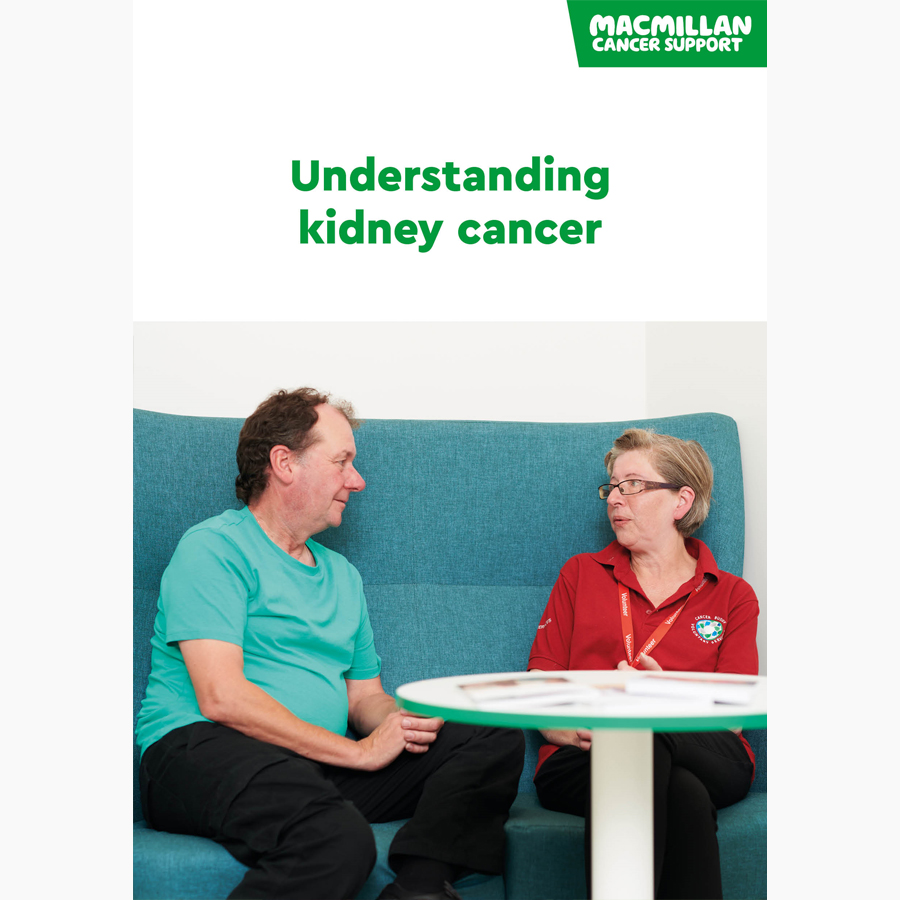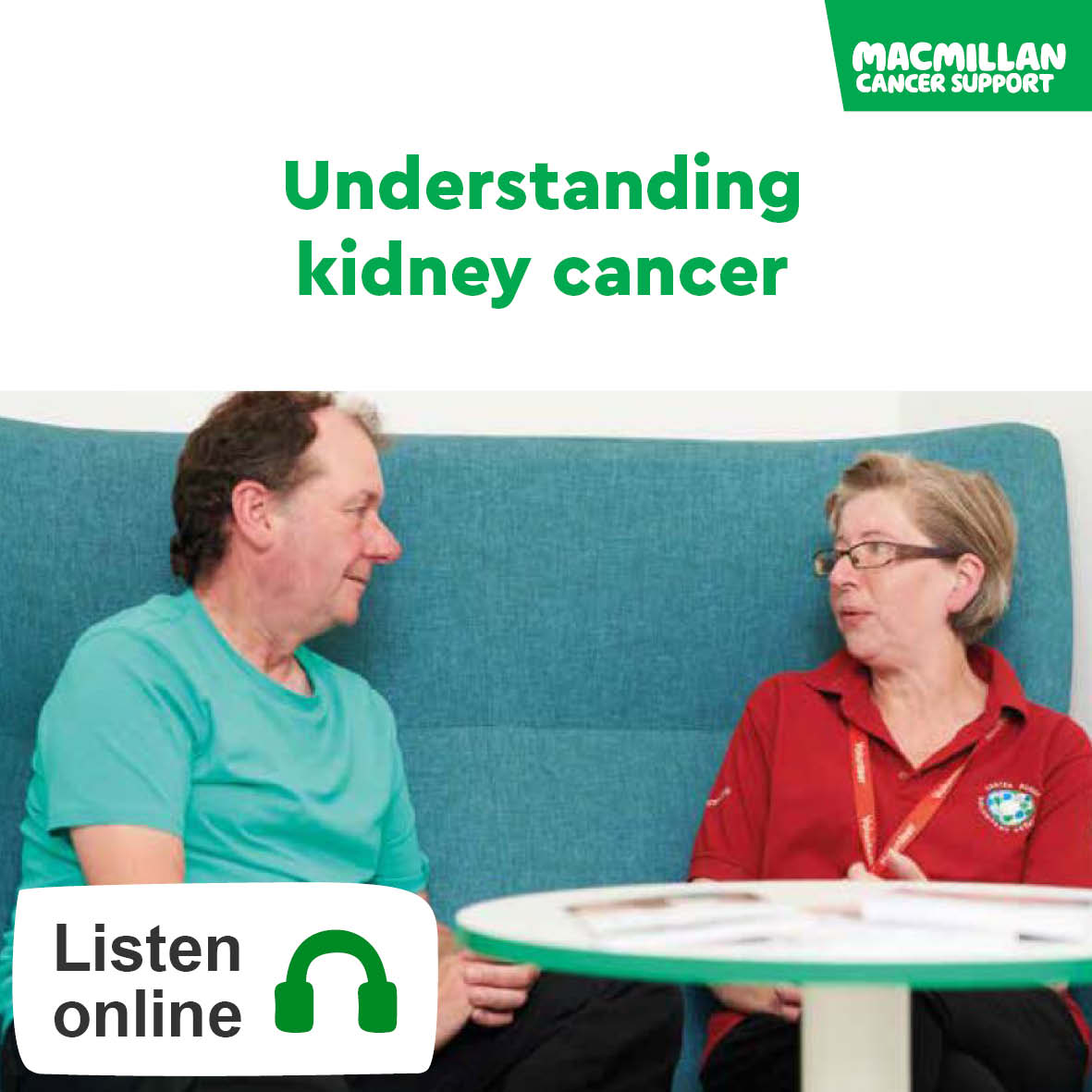Causes and risk factors of kidney cancer
What are risk factors?
The causes of kidney cancer are unknown. But there are certain things that can affect the chances of developing kidney cancer. These are called risk factors.
Having a risk factor does not mean you will get kidney cancer. And not having any risk factors does not mean you will not get it.
Cancer is not infectious, and you cannot pass it on to other people.
If you are worried about kidney cancer and would like to talk to someone, we are here. You can:
- Call the Macmillan Support Line on 0808 808 00 00.
- Chat to our specialists online.
Booklets and resources
Sex
Kidney cancer is more common in men than in women.
Age
The risk of kidney cancer increases with age. Most people who get kidney cancer are over 60 years old. But it can affect people younger than this.
Related pages
Smoking
Smoking increases the risk of kidney cancer. The more you smoke, the greater your risk.
The risk goes down when you stop smoking. After you have stopped smoking for 10 years, the risk returns to the same as a non-smoker.
Being overweight
Studies show that being significantly overweight (obese) increases the risk of kidney cancer.
High blood pressure
Having high blood pressure may slightly increase the risk of kidney cancer. But most people with high blood pressure do not develop kidney cancer.
Kidney disease
People with advanced kidney disease have a higher risk of kidney cancer. The risk is greatest for people who need dialysis. Dialysis is a treatment that does the work of the kidneys if they are not working properly.
Waste products from the blood can sometimes cause hard stones to form in the kidneys. Men with these kidney stones have a higher risk of kidney cancer.
Diabetes
Related pages
Family history
Most people who get kidney cancer do not have a family history of it. But your risk may be higher than average if a close family member has had kidney cancer. Close family members are your parents, brothers, sisters or children.
Related pages
Genetic risk
Some rare genetic conditions can increase the risk of developing kidney cancer. These include:
- von Hippel-Lindau disease
- hereditary papillary RCC (HPRCC)
- Birt-Hogg-Dubé (BHD) syndrome
- tuberous sclerosis
- sickle cell disease or sickle cell trait.
Kidney cancers caused by an inherited gene change (mutation) are more likely to happen at a younger age. They may cause several tumours and can affect both kidneys.
People who have had thyroid cancer have an increased risk of kidney cancer. This may be because of genetic mutations that are linked to both cancers.
Exposure to certain materials at work
About our information
This information has been written, revised and edited by Macmillan Cancer Support’s Cancer Information Development team. It has been reviewed by expert medical and health professionals and people living with cancer.
-
References
Below is a sample of the sources used in our kidney cancer information. If you would like more information about the sources we use, please contact us at informationproductionteam@macmillan.org.uk
Ljunberg B, Albiges L, Bedke J et al. European Association of Urology Guidelines on renal cell carcinoma. 2023. Available from https://uroweb.org/guidelines/renal-cell-carcinoma
Powles T, Albiges L, Bex A, et al. Renal cell carcinoma: ESMO Clinical Practice Guideline for diagnosis, treatment and follow-up. Ann Oncol. 2024 May 22. Available from: https://doi.org/10.1016/j.annonc.2024.05.537

Reviewer
Consultant Medical Oncologist in Renal and Skin Cancers
Royal Marsden Hospital, London
Date reviewed

Our cancer information meets the PIF TICK quality mark.
This means it is easy to use, up-to-date and based on the latest evidence. Learn more about how we produce our information.
The language we use
We want everyone affected by cancer to feel our information is written for them.
We want our information to be as clear as possible. To do this, we try to:
- use plain English
- explain medical words
- use short sentences
- use illustrations to explain text
- structure the information clearly
- make sure important points are clear.
We use gender-inclusive language and talk to our readers as ‘you’ so that everyone feels included. Where clinically necessary we use the terms ‘men’ and ‘women’ or ‘male’ and ‘female’. For example, we do so when talking about parts of the body or mentioning statistics or research about who is affected.
You can read more about how we produce our information here.






